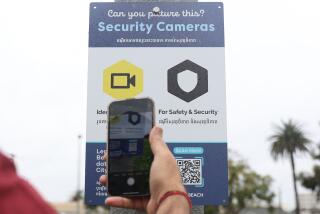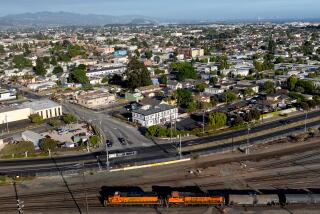Controversy Puts the Spotlight on Public Access TV : Media: The debate over the airing of a white supremacist show has focused attention on the operating procedures at Torrance’s public channel.
- Share via
Every day for the past week, Father Chung Ching Lee has been cooking meatballs on Channel 59 in Torrance. He’ll be cooking meatballs again, every morning and night, at 9:30 a.m. and 7 p.m., until Tuesday.
Lee is creator, producer and host of “Father Lee Egg Roll King’s Cooking Ministry,” one of 17 locally produced shows seen daily on the city’s public access channel, known as Torrance Community Television.
This is not slick, star-studded network fare. Father Lee is a Catholic priest who wears his clerical collar beneath a bright-red apron. On the episode now airing, he sings, accompanied by a violinist, while the meatballs are cooking.
The channel also features talk shows, arts programming and an eclectic array of shows such as “Metology Dutch Guru,” “Cosmic Swami Turbo Head” and “Happy Time Pipers: Seniors Love Torrance.”
This programming mix is typical of many of the public access cable channels in 2,000 communities in California and nationwide. The channels serve as a kind of video soapbox, populated by amateur producers and talk show hosts. And, in many cities, their work goes virtually unnoticed by a viewing public tuned in to the major networks.
But the Torrance channel has drawn unusual attention since October when it aired a white supremacist program called “Race and Reason”--a series denounced by critics as “racist garbage.” Council members raised objections to the series, but City Atty. Kenneth L. Nelson determined that First Amendment protections prevent the city from banning the show. After several scheduling delays, the next segment, submitted by a local couple, is to begin airing Wednesday.
The furor over “Race and Reason” is similar to First Amendment controversies that have cropped up in public access cases in other areas. In Kansas City, efforts to block “Race and Reason” and a show produced by the local Ku Klux Klan led to a lawsuit; the city ultimately dropped its efforts to keep the klan off cable television.
Although no legal action appears to be contemplated in Torrance, the local debate has focused attention on operating procedures at Channel 59, some of which are considerably different from those in other South Bay cities.
Unlike most public access stations in the area, which air a given show only once or twice, the Torrance channel runs its shows at the same time slot every day for two weeks. That means that a series like “Race and Reason”--which has more than 100 episodes--could theoretically run on the station for four years.
Torrance cable administrator Michael Smith said the city repeats its shows for two weeks because it has an automated tape-playing system and lacks the staff to change the tapes manually, and because it wants to give the shows maximum exposure.
In addition, most such channels in the South Bay are run by the cable companies that hold city franchises. Paragon Cable of Los Angeles, for instance, oversees the public access channel that can be seen in Hawthorne, Lawndale, Gardena and El Segundo. And Dimension Cable Services manages the channel seen in cities on the Palos Verdes Peninsula.
But in Torrance, Channel 59 is operated directly by the city. The channel is distributed on the Paragon Cable network, but the people who oversee the programming are city employees.
The City Council doubles as the Torrance Cable Television Public Access Foundation, which has ultimate authority over the station and approves its budget. LeRoy J. Jackson, the city manager, serves as executive director of the foundation. Its chairwoman is Mayor Katy Geissert; its clerk is City Clerk John A. Bramhall.
Some public access experts are critical of the system used in Torrance, saying it leaves the city vulnerable to charges of tampering with the channel for political reasons.
“Because access is a First Amendment forum, there’s a real problem with cities taking an active role in the channel,” said Sharon Ingraham, chairwoman of the National Federation of Local Cable Programmers.
Torrance officials say they entered the public access business somewhat reluctantly when Group W, the city’s previous cable franchise operator, was replaced by Paragon Cable in 1987. The city’s decision to take over the channel was made in the course of its contract negotiations with Paragon, Jackson said.
Under the federal Cable Act of 1984, cable companies must provide a public access channel if a community requests it, Ingraham said. Public access channels are usually managed in one of three ways: by cable companies, by cities or by independent nonprofit foundations. Several cable access experts said they prefer the foundation model. To have a city running the channel “is not unusual, but it’s not ideal,” said Reginald Carter, the cable federation’s operations manager.
But Torrance officials say they prefer to see public access controlled by the city, not by the cable company.
“Actually, I think we provide a much better service, because it’s conducted as a city service would be, like parks and recreation,” said Darren P. Doerschel, Torrance community television coordinator.
City Councilman Dan Walker said the “Race and Reason” debate illustrates why the Torrance system is a good one. “You obviously want to maintain as much control as you possibly can.”
Ron Cooper, operations and training director at Access Sacramento, the foundation that oversees that city’s public access channel, said that in the long run, it is often in the public’s best interests to allow such controversial material to be aired.
In 1987, he said, a resident submitted “Race and Reason” to the public access station in Sacramento, which aired the series. As a result, local black and Jewish groups began producing their own shows that appeared on the channel, Cooper said.
“Indeed, the system works, if you allow people freedom of speech,” he said.
Only 13 episodes of “Race and Reason” were submitted to the Sacramento station, and the series faded away, Cooper added. “Frankly, it was a relatively boring talk show,” he said. “It’s just talking heads.”
Sue Gibbons, who heads the city’s Cable Television Advisory Board, says the quality of the Torrance public access channel has improved dramatically since the city took it over three years ago. “It’s like night and day,” she said. Operations run more smoothly, and “we don’t have the discussions that have to go on between the cable operator and the city about who’s responsible for getting something done.”
One producer, Priscilla La Marca of Torrance, praised the city’s facilities.
“We do happen to have one of the nicest studio facilities and equipment available,” said La Marca, producer and creator of “The Arts and You,” a feature program about the arts that is made in Torrance. But La Marca said she would like to see producers have more time to use the studio. And she added: “Any time you’re tied in with a city budget, you’re limited to rules and red tape.”
A growing number of residents like La Marca are producing and editing their own shows at the Torrance studio. In November, the channel reported that local residents spent 50 hours shooting programs in channel studios and 319 hours in the station’s editing rooms.
But “Race and Reason” is what Torrance officials call a “bicycled tape,” a show produced elsewhere that has been submitted for airing.
The station’s rules, like those of other public access channels, say it must air tapes submitted by local residents as long as the tapes do not contain obscene material, advertising, political endorsements or lottery information.
“Race and Reason” first aired in Torrance for two weeks in October, attracting little attention. But the City Council, concerned about the series’ content, asked the city attorney to study whether the series could be banned.
The city then instituted new rules for “bicycled tapes.” Residents submitting the tapes are now required to provide written permission from whoever holds the copyright. And at the beginning and end of the bicycled tape, the city has begun running the name and address of the resident who submitted it, together with a disclaimer that the city is not responsible for the program.
The city’s cable administrator notified council members in a Dec. 28 memorandum that “Race and Reason” would begin airing at 11 p.m. Jan. 8; the date was later changed to Jan. 9. Meanwhile, Geissert obtained a tape from the Anti-Defamation League that she asked to air at 10:30 p.m.
However, Walker argued that the city should not “roll over” and show the tape without a fight. He called Jackson on Jan. 4 and asked that the City Council have a chance to discuss the matter.
In its role as the cable access foundation, the City Council met in closed session Jan. 8 to discuss “Race and Reason.” Afterward, Jackson announced that the tape submitted by Katherine and Paul Beaton of Torrance was technically defective and was being struck from the Jan. 9-22 schedule.
Katherine Beaton said recently that she was growing frustrated with what she sees as delaying tactics by the city.
For instance, she said, the Beatons rushed a substitute tape of another episode to city studios the evening of Jan. 9, only to be told that because of scheduling requirements, it could not air until this Wednesday, she said.
“It’s just getting real gamesy,” Beaton complained.
Smith said the Beatons have submitted two more tapes, asking that they be aired in the two-week cycles after the episode that is scheduled to start Wednesday. Smith said he had not yet reviewed the tapes but that he did not expect technical problems.
Meanwhile, Gibbons said the city’s cable advisory board may discuss how to limit the number of bicycled tapes appearing on Channel 59, perhaps by giving preference to local producers. That discussion would be a result of the growing number of local producers and shows, Gibbons said Friday. “We’re not doing it to limit any particular program, I assure you.”
The Long Beach public access channel limited bicycled tapes to one showing apiece after a dispute arose over “Race and Reason” and another controversial tape. And the Paragon public access channel serving the Hawthorne-Lawndale-Gardena area generally does not run shows produced outside the system area.
But Ingraham at the National Federation of Local Cable Programmers warns against severely limiting outside programming.
“I say, ‘Don’t do that.’ You could cut off a whole lot of interesting programs,” Ingraham said.
And Robert Purvis, legal director at the National Institute Against Prejudice and Violence in Baltimore urges communities not to overreact to series such as “Race and Reason” and not to scapegoat public access television.
“My concern is that the people who are trying to deal with racism in the community don’t end up making matters worse,” Purvis said.
At least one local producer says she believes “Race and Reason” should not be banned from the public access channel.
June Armstrong, who produces a feature show called “What’s Happening,” says efforts to curb such programming could backfire.
“You could be standing on the other side of the street and saying, ‘June, I hate your show and don’t think it should be on.’
“I could be facing the same thing.”
More to Read
The complete guide to home viewing
Get Screen Gab for everything about the TV shows and streaming movies everyone’s talking about.
You may occasionally receive promotional content from the Los Angeles Times.






